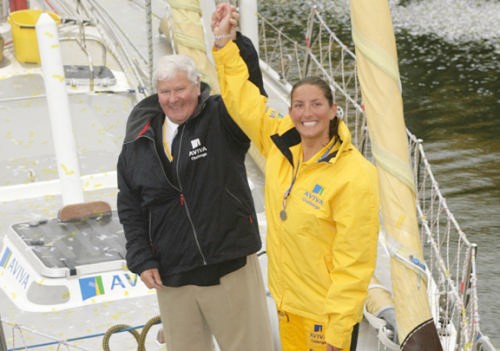Knox-Johnston and Blyth's Madmen-Where are they?
by Des Ryan on 2 Apr 2007

Sir Chay Blyth greeting Dee Caffari after her solo circumnavigation SW
The sad news that
Sir Chay Blyth's Challenge Business couldn't get a buyer at any price, and will now be sold off by the liquidator is in stark contrast to the great news that his old competitor
Sir Robin Knox-Johnston, is well on the way to finishing another round-world solo race -the Vendee Globe
In 1968, the two were competitors in the
Golden Globe Race, two of nine sailors who set off on the very first ever non-stop solo round the world race. The story of that race is the stuff of novels, and certainly stranger than fiction.
Sir Robin won the race - because he was the only one who finished.
He 'performed underwater repairs, shot sharks, rigged up impossibly ingenious solutions to crippling problems and accidentally splashed battery acid in his eye. A maniac of English pluck and reserve, he revealed not a whit of emotion in his log.'
While Sir Chay retired from that race just past the Cape of Good Hope, he had already rowed across the Atlantic, was the first person ever to sail solo non-stop around the world the 'wrong way' and has a long line of other sailing achievements, including the sponsorship of Dee Caffari's recent successful solo 'wrong way' effort.
Both of these sailors have remained in the public eye, revered for their sailing accomplishments.
The story of one of the other competitors, Donald Crowhurst, has been a source of fascination for the sailing public ever since, and has recently inspired a movie. Crowhurst first cheated in the race by falsifying his position, then when the pressure became too great, wrote a series of crazy diaries, and then, presumably, jumped overboard. His trimaran was found floating in the Atlantic with dual logbooks and diary on board, and it is still marooned on a beach in Cayman Brac, an island in the Caribbean, if you would like to go see it.
But what of the other six? At least three of the stories are bizarre, entertaining, tragic or a combination of these.
Bernard Moitessier, for instance, about to win the race, decided that he would rather keep sailing than endure the fuss that would accompany his win, so did just that – kept sailing, and ended up in Tahiti. Moitessier wrote several books about his voyages and the sea, and was an environmental activist against nuclear weapons in the South Pacific. He died of cancer in 1994
John Ridgway, Sir Chay Blyth's buddy rower across the Atlantic, lonely and leaking, limped into Recife in Brazil, but his story has a happy ending. He went on to found a School of Adventure in Ardmore in Scotland, served with the SAS, and continued to sail round the world in boats called English Rose. The world's public last heard of him in 2003/4, when he circumnavigated once again to highlight the plight of the albatross.
However, he and his wife still live, retired, at Ardmore, and their home is still in the crofthouse on the hillside above the loch. You can stay in the houses on Ardmore, having the option of a day’s seakayaking, rock-climbing, hillwalking, or survival at Cape Adventure across the loch at Skerricha. Or, you can simply relax and enjoy the peace and quiet, far from the road.
Of the final four, the saddest of was Nigel Tetley, a Royal Navy lieutenant commander, who persisted long enough to become the first circumnavigator in a multihull. Then his battered trimaran ketch sank just 1,000 miles from England, near the Azores. Unable to raise enough money to complete a new boat, he hanged himself four years later.
Less is known of the final three:
Loick Fougeron was a friend of Moitessier's. After his first Southern Ocean setback Fougeron steered happily for Capetown, but he was a sailing hero in France, and his sailing has inspired many French sailors.
Bill King, a farmer and former British Navy submarine commander, retired in the Southern Ocean. Sailing a junk-rigged boat, his foremast had broken and his mainmast fractured. However, unlike the tragic Tetley, King finally completed a circumnavigation in 1973.
Alex Carozzo was an Italian entrant, who had already sailed across the Pacific, and is sometimes called 'Italy's Chichester'. He abandoned his bid in Portugal, the victim of a bleeding ulcer.
The complete story of the race, and the detailed stories of each of the competitors has been told in a fascinating book by Peter Nichols, called 'A Voyage for Madmen', published by Harper Collins – a brilliant read!.
Sail-World is sorry to see the current commercial demise of Sir Chay, a long-time hero for many a weekend sailor.
If you want to link to this article then please use this URL: www.sail-world.com/32168